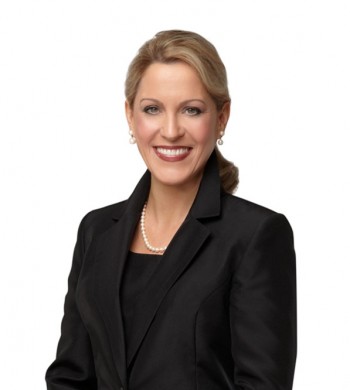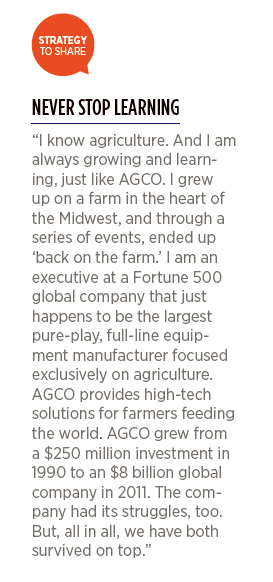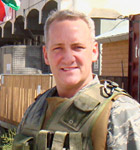
In some ways, attorney Debra Kuper’s life has come full circle. A farmer’s daughter, she grew up as one of five children in the “corn belt” of Central Illinois. Now, at the age of 46, she’s vice president, general counsel, and corporate secretary at AGCO Corporation, a top international manufacturer of agricultural equipment. To find out how she went from riding tractors to representing one of its leading makers, Profile asked Kuper about her life on the farm, her circuitous route to corporate law, and her secrets to “having it all”: a happy family, a healthy life, and a prolific career.
What did growing up on a farm teach you?
I drove a tractor before driving a car. We five children had strong Midwestern work ethics; we bailed hay and detasseled corn by hand, waking up at the crack of dawn to avoid the long, hot summer afternoons. In the late ’70s, the farm economy crashed. My father, then in his 50s, quit farming and went to work at the local grain cooperative. We had an excellent small-town school system that encouraged higher education, as did our parents. The combination of the hard manual labor, excellent school system, and our parents’ perseverance resulted in all five of us children obtaining college and post-graduate degrees. All in all, being a “farmer’s daughter” taught me to be independent and responsible at an early age. It taught me how to face adversity and work through tough situations. And, it taught me to be flexible and change my course in life when life called for a change.
When you started college, you wanted to be a teacher. How did you end up in law?
I took a circuitous route to get where I am today. I married during college and followed my husband to the Chicagoland area for his job. I did not finish my teaching degree because I had our two sons early. I was a homemaker until they started school. I decided to work outside the home, but was uncertain about a career path. My interest in teaching had waned, but I was able to finish my bachelor’s degree in what was previously my minor, political science. I then sought a post-graduate degree. I took both the GRE and the LSAT, hoping that whichever test came back higher would be a logical fit for me. Much to my surprise, I did better on the LSAT, so I chose law school. I started law school at the age of 29. I studied when my sons studied and slept when my sons slept. I made law review and graduated in three years with honors. So while it was an indirect path to a law degree, it made me into the person I am today: personal, practical, and professional.
Why did you go into corporate law, in specific?
At heart, I am a businessperson who just happens to be a lawyer. It is the best of both worlds. I enjoy focusing on overall business objectives to determine possible legal hurdles, formulate creative compliant solutions, and develop legal strategies to help achieve corporate objectives.
You won the International Law Office 2011 Employment Law Team of the Year Award. What’s the secret to managing an international team?
I supervise all of the company’s 25 in-house attorneys and 12 support staff dispersed throughout Argentina, Brazil, China, France, Germany, Russia, Switzerland, and the United Kingdom. When I joined the company in 2008, I quickly discovered that the in-house attorneys had never officially met each other. In 2009, I traveled around the world to meet and greet my team members. After an overall assessment, I encouraged them to hold regional meetings. This was done in 2010, and it was a fantastic time of sharing best practices, meeting local executives, listening to seminars conducted by outside counsel, and generally socializing after several busy days of work. The regional meetings were such a success that in January 2011 I held the first-ever AGCO Global Legal Summit in Atlanta to share best practices, provide presentations, listen to speakers, and participate in panel discussions. It was a growth opportunity that instilled excitement, encouragement, and engagement throughout the whole team.
A Message From Lewis, Brisbois, Bisgaard & Smith
Jay Barber, LBBS contact partner for AGCO, says, “We value our relationship with AGCO, and are proud to assist AGCO in reducing its legal spend through our full array of legal services provided, reduced rate structure as compared to general-practice firms, and national scope of practice, with 21 offices throughout the country. We look forward to assuring AGCO’s continued success in both results and cost reductions.”
You won another award: the Georgia Women’s Conference’s “Glass Ceiling Award.” Have you faced any glass ceilings?
My first job as a lawyer was with a boutique law firm specializing in commercial litigation. I liked the “commercial” part, but not the litigation part. So, I switched gears and went in-house at Case Corporation, a local farm-equipment manufacturing company. It was during my stint at Case that I realized I wanted to be a general counsel of a corporation. But, I did not have the necessary “tools in the toolbox.” In 2001, I left the company and the next few years gathered the necessary tools to become a general counsel. I did M&A work at Tenneco Inc., international purchasing work at (Walmart), and regulatory work at Caterpillar Inc. In 2001, Caterpillar sold its farm-equipment line to AGCO, and when AGCO’s general counsel was ready to retire, I was invited to come aboard. I did so in January 2008. By that time, I had the necessary tools.
Many professionals struggle with work/life balance. How do you, personally, achieve it?
I run. A lot. The beauty of running is that you can do it anywhere. I have had amazing runs in gorgeous localities like France, Italy, and Switzerland. It takes an hour from start to finish. And there are new, lightweight running shoes that are easy to pack. For me, there is no excuse not to run.


